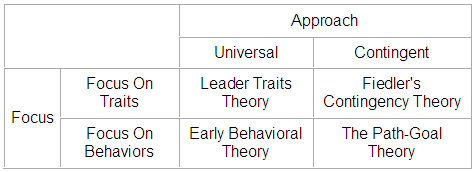I've been doing some research into leadership theories and have found what I think is a useful matrix and approach for categorising much of what is already out there. The matrix is from the work of Arthur G. Jago and it looks at focus and approach.
Jago's Framework of Leadership Theories:

The following is taken from the Leadership Theories page on About.com;
"Focus" refers to whether leadership is viewed as a set of traits or as a set of actions. Focus on Traits: Theories with such a focus see leaders as having certain innate or inherent personality traits that distinguish them from non-leaders. These personality traits are supposed to be relatively stable and enduring. Focus on Behavior: Theories with this type of focus see leadership as observable actions of the leader instead of personality traits.
"Approach" is concerned with whether a particular theory or model of leadership takes a universal or a contingent perspective. Universal Approach: This approach believes that there is a universal formula of the traits or behavior for an effective leader. In other words, the universal approach assumes that there is "one best way" to lead in all situations. Contingent Approach: Contrary to the universal approach, the contingent approach does not believe the "one best way" formula. It believes that effective leadership depends on the specific situation.
If we take each of these quadrants in turn, I would place the well known psychometrics into the Universal Traits box. This would include 4G, NEO, 16PF and MBTI amongst others. Universal Behaviours would link to the idea of competencies and is perhaps less empirical than traits. We wrote a piece which outlines these differences called "Character traits and their use". I think Contingent Traits would hope to be picked up by 360 degree feedback and appraisals. Certainly, 360 degree feedback is reasonably objective and would often focus on specific 'traits'. Finally, I would include things like NLP and Situational Leadership into the final quadrant, Contingent Behaviours. These seem to be very contextually driven and highly pragmatic in nature.
Anyway, I hope this breakdown is reasonably clear. Its certainly helped me to explore things in a little more depth.





By johnnie@johnniemoore.com July 7, 2005 - 8:54 pm
Nice analysis and summary. I know which box appeals to me – bottom right. Leadership not as some deep character trait, but something that each of us can do, according to the context.